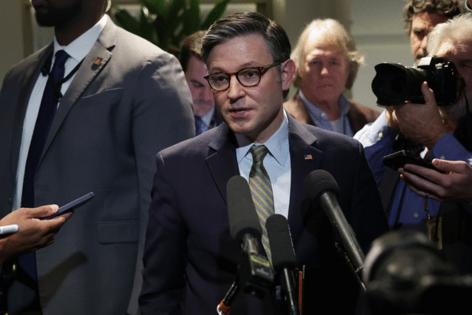House votes to approve stripped-down funding bill to avoid shutdown
Published in Political News
WASHINGTON — The U.S. House voted late Friday to approve a package funding the government through mid-March and providing emergency aid for homeowners, businesses and farmers affected by recent natural disasters.
Democrats joined some Republicans to give 366 votes for passage to the temporary funding bill. Thirty four Republicans voted against the bill.
After two earlier failed attempts, Speaker Mike Johnson offered a “Plan C” to avoid a government shutdown. The U.S. Senate votes next, which will likely occur Saturday. If that happens, the shutdown would technically begin at midnight, but if the Senate approves the bill, the American public likely would experience minimal effect.
The Plan B package went down in flames Thursday because of opposition from Democrats and 38 conservative Republicans opposed to raising the debt limit. By contrast, this latest proposal only includes temporary government funding, $100 billion in disaster relief and $10 billion in aid for farmers.
U.S. Rep. Buddy Carter, R-Ga., said he believes this approach is the best way forward as lawmakers look for a way to fund the government ahead of a planned holiday recess.
“I cannot go home without disaster relief,” he said. “If I leave this building without disaster relief, I’ll go somewhere, but it won’t be home.”
His GOP colleagues, Reps. Andrew Clyde and Rich McCormick, voted against the deal. Clyde said he wants to pass disaster aid to help Georgians affected by Hurricane Helene, but he won’t sign off on new spending that is not coupled with budget cuts elsewhere.
“I cannot in good conscience vote for legislation that adds $110 billion to the deficit, which is why I offered House GOP Leadership numerous options to pay for this aid,” the Republican wrote on X. “Unfortunately, all of these offsets were rejected.”
Rep. Marjorie Taylor Greene, R-Ga., missed the vote. So did Rep. Drew Ferguson, R-Ga., who is leaving the House, missing what would have been his final vote in office.
House Republicans hashed out this new plan during a two-hour closed-door meeting Friday afternoon and planned to bring it to the floor for a vote using rules that allow bills to be fast-tracked.
But those rules also require two-thirds support for passage. That means the help of Democrats will be required, especially since Clyde will likely not be the only conservative who votes “no.”
House Democrats held their own private meeting Friday morning and emerged saying lines of communication were open with Johnson and that they hoped to reach an agreement.
Johnson also worked to obtain tentative approval from President-elect Donald Trump by promising him an eventual debt-limit increase, something Trump wants to make it easier to pass parts of his agenda, such as tax cuts, once he takes office Jan. 20. While there will be no vote on the debt ceiling as part of Plan C, Johnson has verbally agreed that Republicans will raise the debt limit by $1.5 trillion in the new year. To appease conservatives who are concerned about rising federal spending, $2.5 trillion in spending cuts are also part of the agreement.
A nod from Trump could boost GOP support for this funding deal, while his opposition could increase the likelihood of a shutdown.
As of Friday morning, Trump was still encouraging Republicans to reject any deal that does not include a debt-ceiling increase. He said he was open to allowing the shutdown to commence as an alternative.
“If there is going to be a shutdown of government, let it begin now under the Biden Administration, not after January 20th, under ‘TRUMP,’” the president-elect wrote.
For the past few days, Democrats have accused Republicans of turning their back on the original agreement they negotiated with Johnson, but they came to speaker’s aid Friday night.
U.S. Rep Sanford Bishop, D-Ga., voted in favor of the bill.
“It’s a win, especially for the farmers of Georgia,” he said, adding the proposal improved when the debt limit hike was removed.
The original plan fell apart when it drew opposition from tech billionaire Elon Musk and later Trump, who described the deal as both bloated with Democratic proposals and lacking the debt-limit increase.
U.S. Sep. Raphael Warnock said he wished Johnson had stuck with the original legislation negotiated by Republican and Democratic leaders in both chambers. Warnock said a government shutdown became more likely because of Musk’s interference.
“He’s unelected, and he’s created a whole lot of damage,” the Democrat said. “So, while I’ve got colleagues on the other side of the aisle who are busy listening to co-president Musk and co-president Trump, I’m listening to the people of Georgia, especially the farmers who are struggling to get disaster relief.”
With House approval, the bill goes to the Senate, where 60 votes would be needed to gain approval.
______
©2024 The Atlanta Journal-Constitution. Visit at ajc.com. Distributed by Tribune Content Agency, LLC.




























































Comments